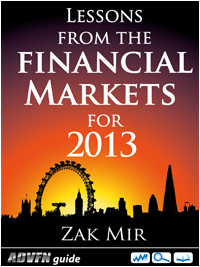
As luck would have it I started writing Lessons From The Financial Markets For 2013 in the first week of October, the anniversary of the death of Apple (AAPL) supremo Steve Jobs. At that time the shares had soared almost exponentially, not even blinking when Jobs died and slapping down all of those who had thus far attempted to call time on a mega bull run. So there I was starting at a blank word document, with the obvious starting point for the book, but with the challenge of writing about the most analysed and blogged about company in the universe. The following is what I came up with: it is strange, but I think, is as good an explanation as any as to the shock collapse of the iPad maker’s shares this autumn.
1. Apple: The First Year After Steve Jobs
The Set Up:
Perhaps like most people I would like to pride myself on being an original. This means that all things being equal I occasionally think of the original perspective that nobody else has on a topical debate, spot a flaw in an argument which has been taken for granted as a winning one, or find an angle on an issue which is unique – and hopefully better than anything else on the table at that point. Unfortunately, this is increasingly a more and more difficult thing to do in the age of the Internet. Now there are billions of bloggers with attendant opinions and ideas, and you would have thought that on every issue including Apple, one of the most talked about phenomena of the past ten years, not one stone would remain unturned in terms of the views on the world’s largest company.
Therefore I also apologise if what I am going to say is not an original point and is something which every blogger in town has already pointed out. Nevertheless, I believe the following unusual form of analysis still stands. It was interesting that on 5 October 2012, which was a year after the death of Steve Jobs, we actually saw a technical signal combining with the anniversary of his death. What is even more curious is the way that this break of 12 September support at $656 in the first week of October tied in almost exactly with the end of the average length of grief – which is said to be one year.
free stock charts from uk.advfn.com
Indeed, if you believe in the comments on www.caring.com, that it takes about a year for someone to feel better (return to normal) after the death of a loved one, then you may agree that this concept could be one that would affect not only sentiment towards Apple, but also the share price. Of course, turning the argument around in terms of how Apple would do in terms of the price action, this would mean that for the first year after Steve Jobs’ passing the stock was in something of period of grace where nobody would really feel like knocking it down in a serious way. This is even after a fiasco such as the mapping app and the general situation where the company is involved in ugly vanity legal battles with Samsung. That said, the most pertinent factor of all may be that new CEO could never live up to the legend that his predecessor had built up.
On this basis I would suggest that Apple mania had an extra year more than it deserved courtesy of the late Mr Jobs passing. It is now five years since the iPhone was launched in June 2007, and for any mania – including that of the Beatles 1963-1966 (until the Beatles said they were greater than Jesus), Tulips in Holland (1634-7) and the Dotcom Bubble of 1995-2001, this has to be regarded as a long time. To paraphrase Winston Churchill’s speech of 10 November 1942, we may have reached the end of the beginning of Apple’s great bull run. Are Apple products so good looking you want to eat them? Yes. Are they the perfect affordable luxury for straightened times? Yes. Should Apple be the world’s most valuable company? Maybe, but probably not.
As you can see the analysis is part psychological, fundamental, technical, and of course part cynical. I think to analyse the big moves in the financial markets you need all of these weapons, as well as an X factor which could be called gut instinct. In the case of Apple this combined approach delivered the correct answer on what was quite a conundrum, with the reason for the share price collapse being apparently due to the end of the psychology backed one year mourning period following the death of a loved one. In a sense the shares were kept up for 12 months as something of a grace period / collective mark of respect for Steve Jobs.
In Lessons, as you might expect I review the key stocks, markets and events, in the manner of looking back to look forward. For instance, we learned that the ECB President Mario Draghi is not to be messed with if you are a bear of the Euro, and that scandals such as Libor, PPI , tax evasion and money laundering were the best thing that could have happened to the UK banking sector. Strange, but true, and all in Lessons From The Financial Markets 2013 (£4.11).
Read Zak’s Latest book, Lessons From The Financial
Markets For 2013 by
CLICKING HERE
Read Zak’s first book, 101 Charts For Trading Success by
CLICKING
HERE

 Hot Features
Hot Features













